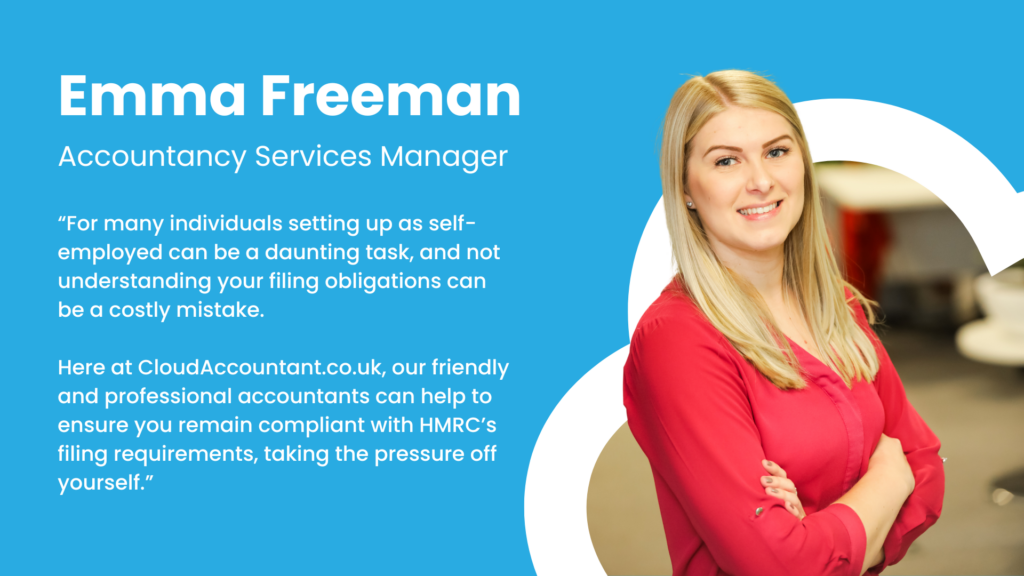If you’re self-employed, you may be wondering how to pay tax. It’s important to understand your tax obligations so you can avoid any penalties or fines. In this blog, we’ll cover the basics of paying tax when you’re self-employed in the UK.
What tax do I need to pay when self-employed?
As a self-employed individual, you’ll be responsible for paying income tax and National Insurance Contributions (NICs). The amount of tax you pay will depend on your profits. You’ll need to report your income and expenses on a Self Assessment tax return each year.
Income tax rates for the 2023/24 tax year in the UK are as follows:
- Basic rate of 20% on earnings between £12,571 and £50,270.
- Higher rate of 40% on earnings between £50,271 and £125,140.
- Additional Rate of 45% on earnings above £125,140.
In addition to income tax, you’ll also need to pay Class 2 and Class 4 NICs. Class 2 NICs are a flat rate of £3.45 per week if your profits are £12,570 or more per year. Class 4 NICs are a percentage of your profits and are calculated as follows:
- 9% on profits between £12,570 and £50,270
- 2% on profits over £50,270
Here at CloudAccountant.co.uk, we can alleviate the pressure of completing your tax return. Our easy-to-use software’s and professional accountants can assist in taking care of your Self Assessment for you. Find out more here.
How much can you earn tax-free if you’re self-employed?
If you’re self-employed, you’re entitled to the same tax-free Personal Allowance as someone who’s employed. The Personal Allowance is the amount you can earn before you start paying Income Tax.
In the 2023/24 tax year, the Personal Allowance is £12,570.
On the basis you have no other income, this means that if your profits are below the Personal Allowance, you won’t need to pay any Income Tax or National Insurance Contributions. Once your profits exceed the Personal Allowance you still start to pay Income Tax and National Insurance Contributions.
When do I have to pay self-employment tax?
You’ll need to pay any tax owed from your self-employment, through the Self Assessment system. The deadline for submitting your Self Assessment tax return is 31st January each year. You’ll need to report your income and expenses for the previous tax year (which runs from 6th April to 5th April).
Once you’ve submitted your tax return, you’ll be able to see how much tax you need to pay. The deadline for paying your tax bill is 31st January. Although you may also have to make payments on account, which would fall due on 31st January and 31st July, should your tax bill exceed £1,000.
It’s important to note that if you miss the filing or payment deadlines, you’ll be charged interest and penalties. If you’re unsure about your filing requirements, it’s best to check with HM Revenue and Customs (HMRC) or an accountant like ourselves, to ensure you have the most accurate information.
How to pay your tax liability?
There are several ways to pay your self-employed tax bill:
- Pay online: You can pay your tax bill online using a debit or credit card, or by setting up a direct debit.
- Pay by phone: You can pay your tax bill by phone using a debit or credit card.
- Pay by bank transfer: You can make a bank transfer to HMRC using the details on your tax bill.
- Pay by cheque: You can send a cheque to HMRC along with your payment slip.
It’s important to make sure you pay your tax bill on time to avoid any penalties or fines. If you’re struggling to pay your tax bill, you may be able to set up a payment plan with HMRC. In conclusion, paying taxes when you’re self-employed can seem daunting, but it’s important to understand your tax obligations. Make sure you keep accurate records of your income and expenses and submit your tax return on time. If you’re unsure about anything, it’s always a good idea to seek advice from a professional accountant or tax advisor.
Do I need to set up as a sole trader and pay tax through Self-Assessment filings?
You’ll need to set up as a sole trader if any of the following applies to you:
- You’ve earned over £1,000 from being self-employed in the tax year (6th April – 5th April).
- You need proof of being self-employed, for reasons such as to claim tax-free childcare.
- You want to make voluntary Class 2 National Insurance payments to help you to qualify for benefits (such as a basic state pension).
To set up as a sole trader, you will need to register with HMRC to pay tax via the Self-Assessment process.
Get in touch to use our services
Emma Freeman, Accountancy Services Manager here at CloudAccountant.co.uk says:
“For many individuals setting up as self-employed can be a daunting task, and not understanding your filing obligations can be a costly mistake. Here at CloudAccountants.co.uk, our friendly and professional accountants can help to ensure you remain compliant with HMRC’s filing requirements, taking the pressure off yourself.”

Our user-friendly service allows you to file your return without the fuss.
- Fill out our user-friendly online questionnaire to provide our accountants with the details of your income for the tax year.
- Our qualified accountants will check over your information and complete your Self Assessment in compliance with HMRC, so you can be sure of the tax you owe or any refunds you may be entitled to.
- Once you have approved your Self Assessment, our skilled accountants will submit your return to HMRC on your behalf.
Get in touch today to find out more about how we can help.







